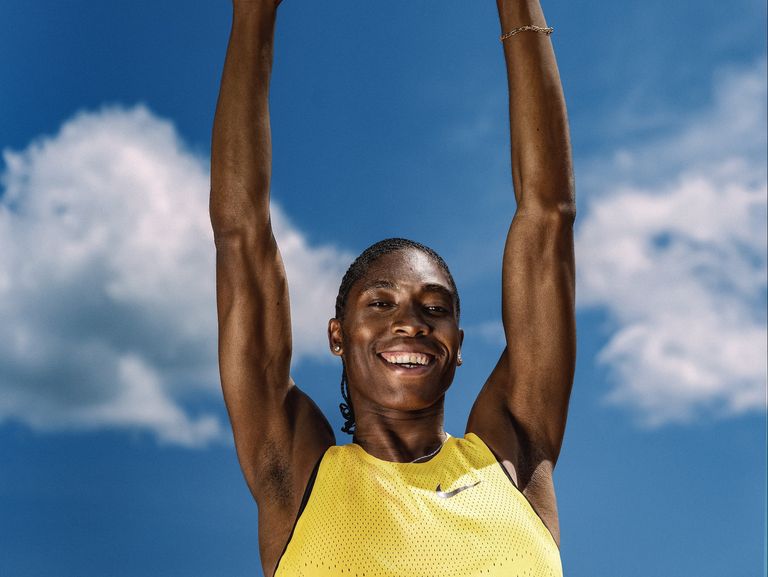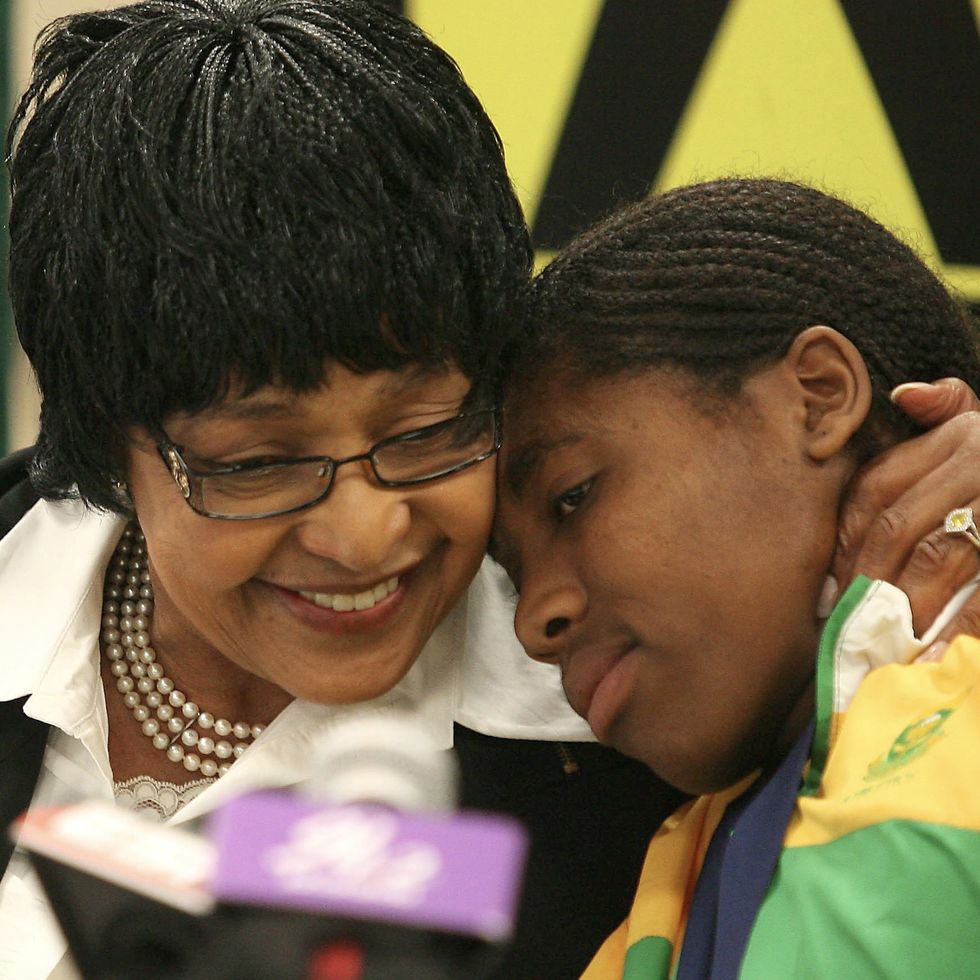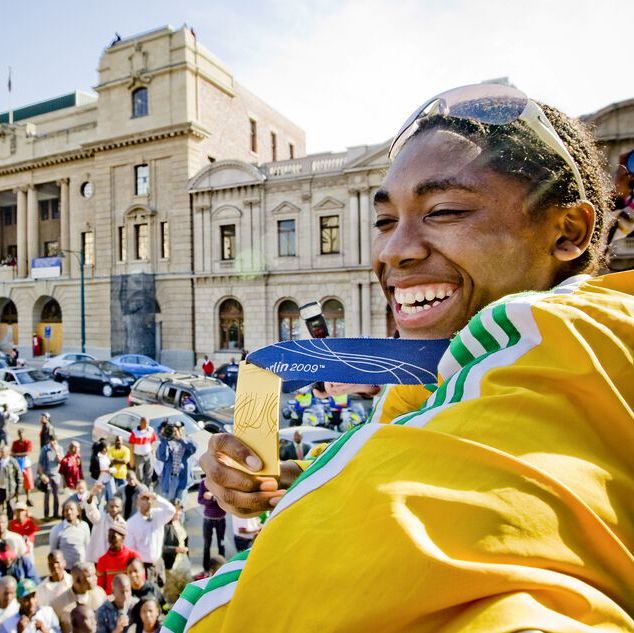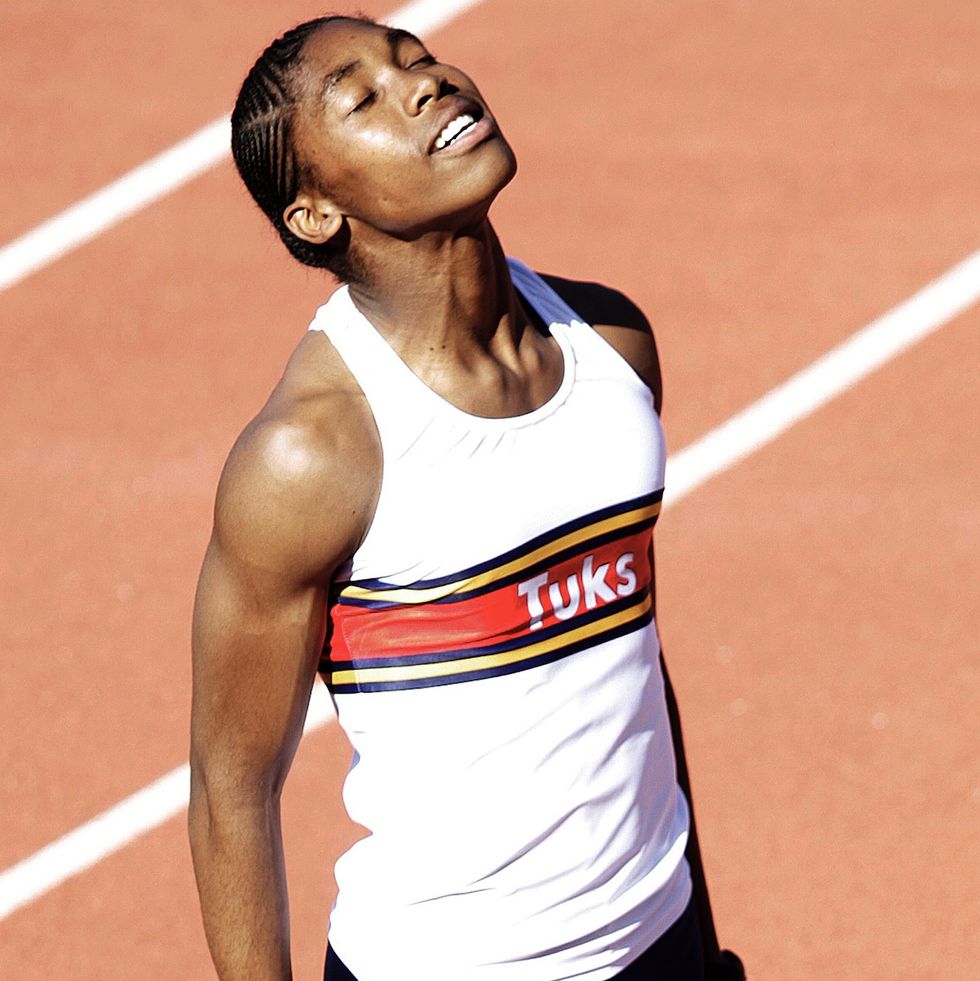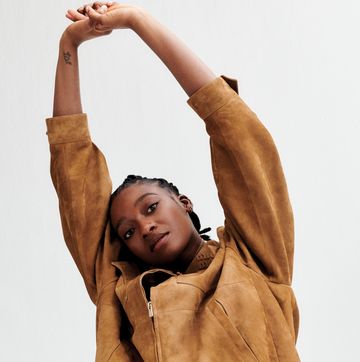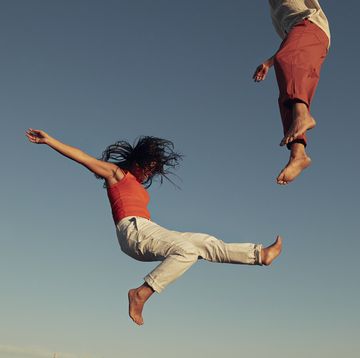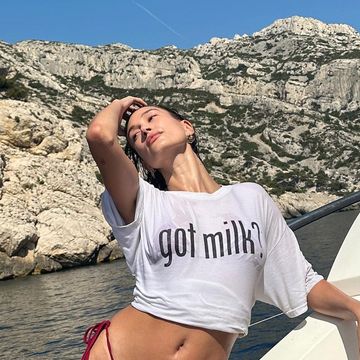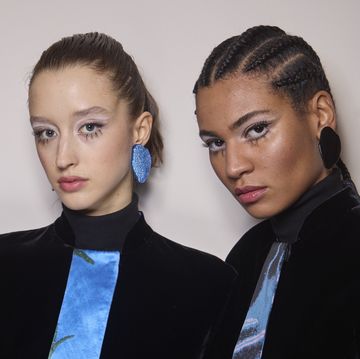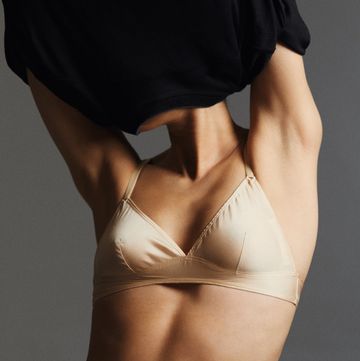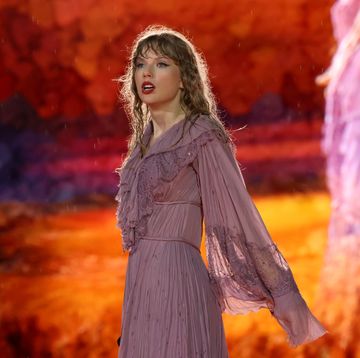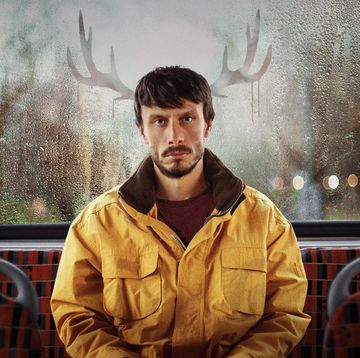Caster Semenya’s story is one of hard-earned confidence, and peace of mind, after years of personal and professional storms. When we meet in a large room on the top floor of a nondescript hotel in central London, the world-class athlete is a picture of warmth and openness. She is dressed simply, in a white tank top and checked shorts that almost reach her knees. Her black hair is neatly cornrowed back from smooth skin and delicate features. She has a characteristic diamond stud in her ear, rings on her fingers, and, most majestically, a necklace with a symbol of her post-run victory cobra pose dangling across her chest.
Semenya exudes a self-acceptance which will not be rocked by anybody, especially people she doesn’t know or care for. And it’s precisely in this way that the 32-year-old is approaching telling her story for the first time, in her own words with the release of her memoir, The Race To Be Myself, which will be published later this month.
Her candidness is surprising not least because for years the media has picked apart her image, hounded her friends and family, and have arguably been instrumental in helping to dismantle her career as one of the greatest runners in modern history. Among countless other titles, she won three World Championship gold medals and two Olympic gold medals in the 800m race from 2009 to 2017, until her career was cut short by a raft of controversy around her gender instigated by the sport’s governing body and their rules concerning testosterone levels.
‘I want people to understand that, yes, I'm an athlete on the field. I'm a well-known person,' she says with her trademark wide, slightly lopsided grin. 'But in my house I’m a parent, I’m a wife, and all these things.' She spreads her arm across the table to illustrate her point. ‘If you accept yourself, you love yourself, you appreciate yourself and then you give yourself enough respect, it's easy for people to give you that,’ she says.
Semenya was born Mokgadi Caster Semenya in the South African province of Limpopo, and grew up in the cradle of two tiny village communities, Ga-masehlong and Fairlie, which, she writes, ‘accepted me as I was and never made me feel like an outsider’. She keeps a close, tight friendship circle. ‘I'm a very, very private person, but I keep the friends that have been there for me,’ she says. ‘If I know you, that doesn’t mean I’m your friend. But those ones that I grew up with in the village? They’re still my friends.’ She refers to the spirit of ‘Ubuntu’, a Bantu term that means humanity, or, more evocatively, ‘I am because we are’.
She benefited from the kindness of fellow South Africans time and time again during her childhood — from when she was hospitalised for seven months at just seven years old while waiting for a knee operation (‘I became one of their favourite little patients, and the sisters would sneak me extra food,’ she writes), to when she was fatefully gifted a pair of running spikes at the start of her career. Prior to this, she explains, she had run her races barefoot — becoming used to the pain and the blisters. The shoes made her feel as though she was running on clouds.
‘They had the best girls that were coming from these high-standard schools. But I outran them barefoot,’ she smiles, reminiscing about the regional-level 800m race that changed her life as a teenager. ‘When I was going for the next round, they said, "I think you need these". When I went to return them to the school administrator, they said, "No. You're going to need them."’
A few years later, in 2009, she was on a world stage for the first time, at 18 years old — running the fastest races of her life, but also, suddenly, under intense scrutiny. She has long refrained from commenting in detail about what happened to her during this time period, but the book changes everything. It’s a searing indictment of the degrading treatment she has been subjected to.
‘It's not about ego, it’s not about you being selfish, it's not about me, me, me. It’s about others,’ she says of her reasons for releasing it now. ‘It's about making sure that young girls, young Black girls, don't face what I've faced. We have to make it right. We have to fight against injustice.’
The injustices she’s referring to started when she was eighteen years old and was subjected to two humiliating gender confirmation tests without her full consent. She was scheduled to fly out to compete in the World Championships in Berlin when, without warning, she was sent to a hospital in Pretoria by the national governing body, Athletics South Africa. A male gynaecologist in South Africa asked her, ‘Ms Semenya… are you a boy?’ and then looked at her privates.
When she got to Germany, having made it through the championship heats, a team of doctors insisted on using a particularly invasive form of 'gender testing' which I won’t detail here, but that Semenya does write about in the book.
‘I knew the world could be fucked up, that people could be cruel, but I was mostly pissed at the timing. I had already been through this shit in South Africa. It should have been put to rest there,’ she writes. ‘Why did I have to go through it again in Berlin? On my one rest day before the biggest race of my life?’ Later, when the results of the tests were leaked to the media, Semenya found out alongside the world that she had elevated testosterone, no uterus or fallopian tubes — meaning that she couldn’t have children.
Though she claims that she is no longer angry about her mistreatment, there is a righteous defiance in her demeanour when she speaks about it. A sort of gentle fuck-you. ‘People mismanage athletes, exploit athletes, block athletes from being great at what they do,’ she says, calmly, firmly. She knows she is one of many women of colour, often Black women, who have been viewed as suspicious and unfeminine based on the way they look.
This defiance bleeds onto the page. The book is not straightforward on gender. If anything it revels in Semenya’s details about her 'boyish' childhood, spent hunting, herding, swimming and spending time in the bush with male companions. She was often mistaken as a boy, which she would forthrightly correct, but at one point she recollects how she pretended to be a boy — later claiming to a set of new friends that she had a 'twin brother', Thabiso.
She’s always had more male friends than female friends, she says. ‘I don't hold grudges. If I don't like you, I don't like you. I delete you from my heart,’ she chuckles loudly, face breaking into that addictive grin.
But these facts do not take away from the fundamental fact that she is a woman. If anything, it just operates as a reminder of Semenya’s personal security. She is woman because of this, not despite it, seems to be the subtext of the early chapters of the book. ‘They accepted that I was a girl who dressed like a boy, spent most of her time with other boys, and loved sports. I may have looked like a boy, which everyone generally agreed with, but that didn’t mean I was a boy, which was the thing I was accused of being by the international media,’ she writes of her childhood.
She doesn’t feel she’s had much support from other women runners since she’s been on the public stage and doesn’t hold back from criticising peers such as Lynsey Sharp and Joanna Jóźwik, who both became infamous for their post-race comments on Semenya. At the 2016 Rio Olympics, Great Britain’s Sharp gave an emotional interview after running the 800m final against Semenya, who won, claiming how difficult it was after a change of rule regarding testosterone suppression and that they were relying on ‘people at the top sorting it out’. While Poland’s Jóźwik controversially claimed she was proud to have finished as the ‘first European’ and ‘second white’ after the same race.
‘If you're a woman, and then you think another woman is not woman enough, then you're already lost. You get what I'm saying?’ she says emphatically. ‘We say we need to empower each other but we destroy each other. At the end of the day, I'm in this world for a purpose. For me, coming into sports, I'm here to change lives. I'm not here to destroy them. If, as a woman, you are taunting other women, then you show your true colours
She hasn’t been able to run competitively in her favoured 400, 800 and 1500m races since World Athletics enforced their new testosterone regulations in 2019 — she won her discrimination case in the European Court of Human Rights against World Athletics in 2023 but not the right to compete without undergoing surgery or taking drugs that made her feel ill. In fact, this year the rules became even more stringent (Semenya writes that 'it’s personal' between her and the President of World Athletics, Sebastian Coe, and that she believes he has something against her).
Thus, her focus has shifted. The book suggests she has put to bed any dreams of running competitively again in the future, but in person, she is more ambivalent. ‘It depends on how I'm feeling, at the end of the day,’ she says. (‘At the end of the day’ is a recurring refrain of hers. She likes to take everything into consideration.) ‘The main focus now is more on fighting for what's right. Which is the case [against World Athletics]. But it's more of a legal battle. I can't say much about it.’
Alongside her wife Violet Raseboya, she runs the Caster Semenya Foundation (which includes the Masai Athletics Club) and also works as an assistant middle-distance coach at the TuksAthletics Academy at the University of Pretoria. ‘The main goal is building Olympians. I don't want to build someone just to show up,’ she says. ‘Even if it's one athlete, I want to build someone who will win medals.’
She and Raseboya are also mothers to two girls, Oratile, age four, and Oarabile, two. One of the girls loves ballet, while she says the other is more of a firecracker, like her. Raseboya used to be an athlete too and Semenya describes a house filled with love, trophies and medals. With a wicked glint in her eye, she’s laughing again as she speaks about her babies, and how they want to follow in her footsteps. ‘I tell them, if you want to run, you’ve got to be crazy like me!’ she cackles. ‘You have to work hard, sacrifice yourself, only have a few friends.’
She might only have a few friends, but her purpose is bigger than friendship and individual connections. Her ongoing fight, in her eyes, is for humanity.
The Race to be Myself, by Caster Semenya, is published in hardback by #Merky Books on 31 October 2023.
This article was originally featured in the November 2023 issue of ELLE. ELLE collective members are invited to exclusive talk with Caster Semenya and ELLE UK'S Editor-in-Chief, Kenya Hunt, on November 7.
